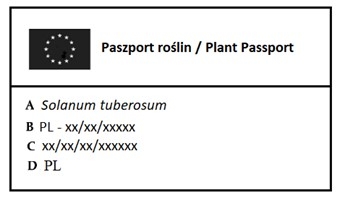Imports of potatoes from Poland and Romania are subject to stricter requirements than from other European Union (EU) countries. This is due to the widespread presence of the plant pathogen Clavibacter sepedonicus (the bacterium responsible for potato ring rot) in these countries. To ensure that potatoes produced do not spread the disease to other countries, a number of additional requirements for the trade in potatoes have been laid down. In Latvia, potatoes from Poland and Romania may only be imported if they have been produced on a registered farm and found to be free from the plant quarantine organism Clavibacter sepedonicus or if the potatoes have been laboratory tested and found to be free from Clavibacter sepedonicus and are accompanied by a plant passport.
The plant passport for potatoes is identical to the plant passport issued for planting material.
A plant passport is a document (in the form of a label) certifying that the plants have been grown on a farm that has:
- registered with a national plant protection organisation (in Latvia, the official register of professional operators of the State Plant Protection Service),
- the plants are subjected to the necessary tests to ensure that they are free from European Union quarantine organisms, protected zone quarantine organisms and regulated non-quarantine organisms.
The plant passport has a common format in all EU countries (rectangular or square) and contains predefined information.
Example of a plant passport for potatoes from Poland:
|
Letter designation: A - botanical name of the plant species B - country of issue of the plant passport and registration number in the Official Register of Professional Operators C - plant passport number D - country of origin of the plant |
If these requirements are not met, potatoes from Poland and Romania may not be imported and traded in Latvia. The State Plant Protection Service is entitled to impose an administrative fine for non-compliance with the requirements in accordance with item 1 of Article 23 of the Plant Protection Law.
Grounds: Commission Implementing Regulation (EU) 2022/1194 of 11 July 2022 on Clavibacter sepedonicus (Spieckermann & Kotthoff 1914) Nouioui et al. 2018




